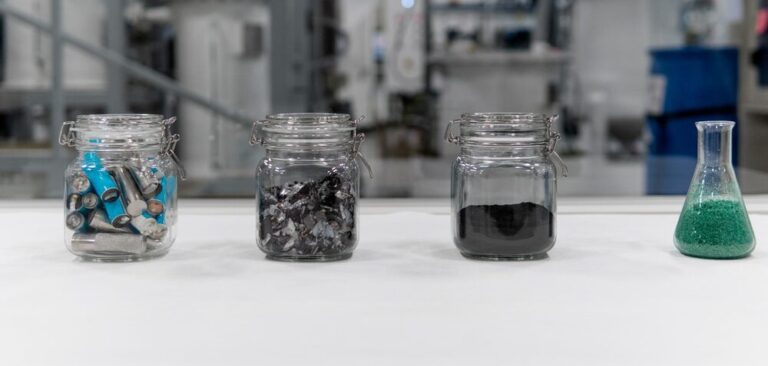Battery cell developer Northvolt has announced that its battery recycling program, Revolt, has produced its first lithium-ion battery cell featuring a nickel-manganese-cobalt (NMC) cathode produced with metals recovered through the recycling of battery waste. According to the company, all recycling and production processes were completed on a single site, at Northvolt Labs in Västerås, Sweden.
Emma Nehrenheim, Northvolt’s chief environmental officer and head of Revolt, said, “What we have shown here is a clear pathway to closing the loop on batteries and that there exists a sustainable, environmentally preferable alternative to conventional mining in order to source raw materials for battery production. The recycling process can recover up to 95% of the metals in a battery to a level of purity on par with fresh virgin material. What we need now is to scale-up recycling capacities in anticipation of future volumes of batteries requiring recycling.”
Recycled nickel, manganese and cobalt metals used in the battery cell were recovered from battery waste through a low-energy hydrometallurgical treatment which involves the use of an aqueous solution to isolate the metals and separate them from impurities. Having proven the validity and efficiency of its recycling process, Northvolt now hopes to scale-up its recycling capacities to fulfil its aim of producing cells with 50% recycled material by 2030.
To achieve this, Revolt Ett, the company’s first giga-scale recycling plant under development adjacent to Northvolt Ett gigafactory in Skellefteå, Sweden, will be expanded beyond its initial design to enable recycling of 125,000 tons of batteries per year. With construction beginning in Q1 2022 and operations in 2023, the recycling plant will receive incoming material for recycling from two sources: end-of-life batteries from electric vehicles and production scrap from Northvolt Ett.
In addition to becoming Europe’s largest battery recycling plant, Northvolt states that Revolt Ett will be the only large-scale facility in Europe capable of recycling lithium in addition to nickel, manganese, cobalt and other metals. Recovered materials from Revolt Ett will supply the neighboring Northvolt Ett cell manufacturing gigafactory with recycled metals sufficient for 30GWh of battery production per year (half of Northvolt Ett’s total annual cell output).
Alongside direct delivery of nickel, manganese, cobalt and lithium metals into Northvolt battery production processes, Revolt Ett will also recover copper, aluminum and plastics from the batteries and materials it recycles – all of which will be recirculated back into manufacturing flows through local third-parties.
“As the electric vehicle revolution gains speed, we should be mindful that some 250,000 tons of batteries will reach their end-of-life in Europe by 2030. In this, some see challenges and obstacles. At Northvolt, we see opportunity,” said Nehrenheim. “Similar to how we’ve found novel, sustainable solutions for the handling of salt by-product at Northvolt Ett – treating it as a valuable product and not waste – the same is true with end-of-life batteries. Ultimately, a commitment to circularity will not only significantly reduce the environmental impacts of the battery industry, but also contribute to our vision to set a new benchmark for sustainability in manufacturing.”


